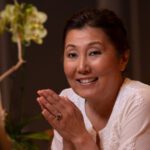My early memories of my mother are of her acting as perpetual hostess: When unexpected guests came to our home, trays of green tea and delectable homemade treats magically appeared. Growing up as a Sansei, third generation Japanese American, I witnessed my mother care for our family and friends with an effortless smile. When I talk about her with my therapist, the two words I use most often are “stoic” and “sacrifice.” As a young girl, I knew something about this made me uncomfortable, but I didn’t have the words. Now, I realize that the root of my discomfort was seeing her in a form of submission, erasing her full self for the benefit of the family and collective.
As a sensitive and introverted child, when there were arguments and raised voices in our home, I would cry, but tears weren’t tolerated. I learned gaman, to endure whatever is happening. Early conditioning led to a form of internalized oppression. I accepted that because I was an Asian girl, my needs weren’t seen, heard, or investigated. I learned to keep feelings closed and locked.
My parents were two of the 120,000+ people of Japanese descent who were incarcerated in American concentration camps during WWII. This overwhelming experience taught them it could be dangerous to show a full range of emotions, and to survive and cope they could not speak openly or honestly to the dominant culture. Seeing them model how not to rock-the-boat, I inherited ways to mute and bury my own feelings. Most of my parents’ generation didn’t have a chance to tend to the trauma of incarceration: how to cope with the deep wound and loss of constitutional rights, livelihood, and property. The fear of anti-Japanese violence and racism, the sorrow of family separation, and the anger of being scapegoated without due process were deep, neglected wounds. Some of us still carry the legacy of imprisonment in our bodies, a kind of untended trauma.
I have also inherited the dharma and a legacy to preserve. I am a descendant of the three treasures: the buddha, dharma, and sangha. What will I to do with my inheritance and legacy, which my ancestors kept intact for centuries in Japan and for over 125 years in the United States? What will become of my inheritance of the dharma if I don’t act and live in a way where my health and vitality matter? How will I cherish this precious moment, life, and connection to all beings?
One day, toward the end of a phone call with a dear friend, I felt compelled to say, “Remember, your health and vitality matter.” I teared up as I spoke. I imagined we were together and placed my hands on my heart. I realized I needed those words, too. It was unlike me, radical even, to turn that sentiment toward my own physical, emotional, and spiritual health. It turns out the words were a dose of medicine I needed.
The first precept, to abstain from killing, is really about cultivating reverence for life. It means to have reverence for our health and vitality.
Self-care is about tending to and remembering the sangha also resides inside of us. The phone call nudged me to remember that I am a part of the mahasangha, the collective community. I often recite a mantra from childhood: “I am alink in Amida’s golden chain of love that stretches around the world.” We keep our link bright and strong by taking good care of ourselves.
It is not selfish to take care of our health and well-being. Early causes, conditions, and conditioning laid a foundation for me to override and erase my feelings growing up. Talking about mental health struggles are stigmatized, and even seem to elicit shame, disgrace, or dishonor in some AANHPI and non-AANHPI communities. At this stage in life, I want to shake up old notions and stigmas. We don’t have time to keep mental health locked away. The world needs us to be present, clear, open, strong, and wholehearted.
To remember my ancestors survived and maintained our Jodo Shinshu tradition while imprisoned at Tule Lake and Gila River concentration camps fills me with buoyancy and confidence. I have a butsudan, a handmade Buddhist altar from one of the camps. Made from scrap wood and painted with shoe polish, it adorns a place of honor in our home. The three treasures stayed intact because many families were stewards of traditionand ritual. We never lost or abandoned our inheritance.

With the guidance of my somatic therapist, I am now in touch with more of my roots, reclaiming my heritage—the fuller origins of our interconnected story. With understanding, patience, and care, I make my way back to expressing more of my true self and original nature.
To practice in stillness, to allow silence to be a friend, and to settle in the energy of mindfulness are boundless gifts. Meditation and trauma-informed practice help to keep me stable and resourced. I bow and greet the gift of the three treasures every morning.
I’m learning to keep in closer touch with my hara, my energetic force, the center that allows me to be present with sincerity and honesty.
There’s much work to do in our world. I have a responsibility to stay fresh, vital in heart mind spirit. My health and vitality matters.
I offer gratitude and devotion to blood, land, and spirit ancestors who kept the practice and traditions alive, for the innumerable conditions to heal, for the ability to preserve and keep the three treasures verdant for descendants and generations to come, for the benefit of all beings.

